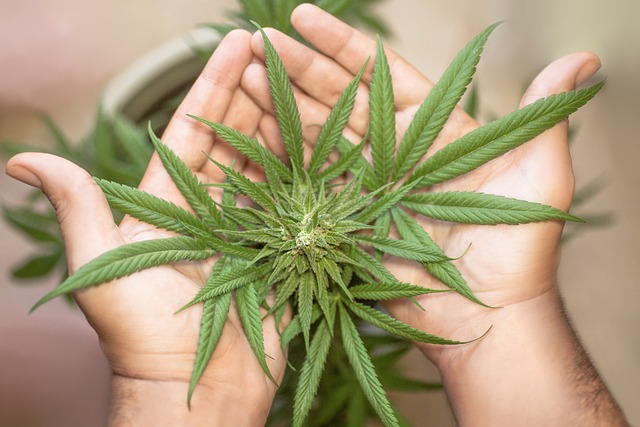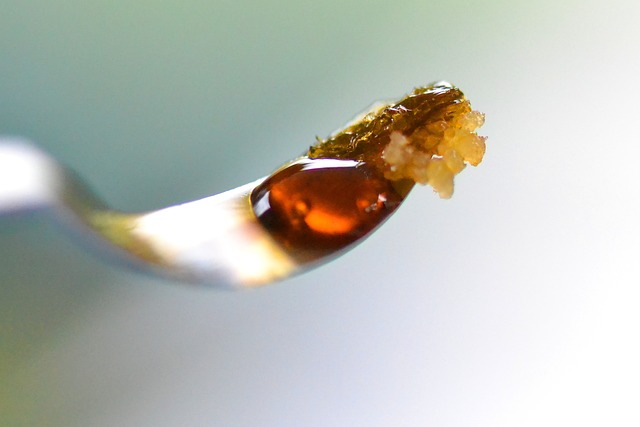The THCA flower, a non-psychoactive component of cannabis, has been recognized for its potential therapeutic benefits due to its anti-inflammatory compounds. Studies indicate that THCA interacts with the endocannabinoid system, influencing pain and inflammation regulation without inducing psychoactive effects. Its unique blend of cannabinoids and terpenes is shown to inhibit enzymes and receptors linked to inflammation, offering promise for treating conditions like arthritis and neuropathy. The THCA flower's anti-inflammatory properties are being investigated for their efficacy in managing symptoms associated with inflammation-related disorders, making it an attractive natural health alternative. User experiences and scientific research collectively support the potential of THCA flower as a non-psychoactive treatment option for pain management and as a source of anti-inflammatory compounds.
Discover the transformative potential of THCA (Tetrahydrocannabinolic Acid) flower, a natural wellness ally that’s garnering attention for its array of health benefits. This article delves into the multifaceted advantages of THCA flower, from its anti-inflammatory compounds to its role in pain management and mental clarity. We’ll explore how this non-psychoactive cannabinoid fits within the entourage effect, its antioxidant properties, and how it can be seamlessly integrated into a daily wellness routine. As regulations evolve and research unfolds, THCA flower emerges as a promising option in the world of natural remedies. Join us as we unravel the science and practical applications behind this versatile botanical.
- Unlocking the Potential of THCA Flower: An Overview
- The Science Behind THCA Flower's Anti-Inflammatory Properties
- THCA Flower and Its Role in Natural Health and Wellness
- Understanding the Entourage Effect and THCA Flower's Place Within It
- Exploring the Therapeutic Benefits of THCA Flower for Pain Management
Unlocking the Potential of THCA Flower: An Overview

Unlocking the therapeutic properties of THCA (Tetrahydrocannabinolic Acid) flower has garnered significant interest within the realm of natural wellness. This cannabinoid precursor to THC (Tetrahydrocannabinol), the psychoactive component found in cannabis, possesses a unique profile of beneficial compounds that offer anti-inflammatory effects. Studies suggest that THCA flower may interact with the body’s endocannabinoid system, influencing pain and inflammation regulation without the psychotropic effects associated with its decarboxylated form, THC. This makes THCA flower a promising candidate for those seeking to harness cannabis’ health benefits without the ‘high’. The anti-inflammatory compounds within THCA flower are believed to stem from a combination of cannabinoids and terpenes, which can modulate various physiological processes. Consumers and researchers alike are exploring the potential of these compounds to address inflammation-related conditions, with preliminary findings offering an optimistic outlook on their efficacy and safety. As interest in alternative and natural health remedies continues to rise, THCA flower stands out as a subject of increasing scientific scrutiny, with the potential to unlock new avenues for non-psychoactive therapeutic use.
The Science Behind THCA Flower's Anti-Inflammatory Properties

Laboratory studies have shed light on the potential anti-inflammatory effects of THCA, or tetrahydrocannabinolic acid, which is the raw form of THC found in cannabis plants. These compounds interact with the body’s endocannabinoid system, a complex cell-signaling system identified in the early 1990s. Research indicates that THCA may inhibit the activity of certain enzymes and receptors involved in inflammation responses, suggesting its role as an anti-inflammatory agent. The anti-inflammatory compounds present in THCA flower have been observed to modulate the immune response, which could be beneficial for conditions where inflammation plays a pathogenic role. This modulation is thought to occur through various molecular mechanisms, some of which involve the downregulation of pro-inflammatory cytokines and the upregulation of anti-inflammatory mediators. The therapeutic potential of THCA flower’s anti-inflammatory properties continues to be a subject of scientific interest and exploration.
THCA Flower and Its Role in Natural Health and Wellness

Delta-9-tetrahydrocannabinolic acid (THCA) is a naturally occurring compound found in the cannabis plant that has been gaining attention for its potential health benefits. THCA is the precursor to the more well-known psychoactive compound, delta-9-tetrahydrocannabinol (THC), but it offers distinct properties on its own. The THCA flower, rich in this cannabinoid, is being explored for its anti-inflammatory compounds that could play a significant role in natural health and wellness routines. Research suggests that THCA interacts with the body’s endocannabinoid system, which regulates various physiological processes, including pain sensation, mood, and immune response. This interaction may contribute to the anti-inflammatory effects observed, making the THCA flower a potential natural alternative for those seeking relief from inflammation-related conditions without the psychoactive effects associated with THC.
The anti-inflammatory properties of THCA are also being studied for their potential to support overall wellness. Unlike many pharmaceutical anti-inflammatories that can come with side effects, THCA is believed to modulate immune responses in a way that could help manage inflammation without the same risks. This makes it an intriguing subject of interest for those looking to incorporate natural solutions into their health regimen. The THCA flower, often consumed through smoking or vaporization, provides a concentrated source of these compounds, allowing individuals to directly benefit from their therapeutic potential. As research continues to evolve, the role of THCA in natural health and wellness is becoming increasingly clear, offering hope for those seeking alternative methods to maintain balance and vitality in their bodies.
Understanding the Entourage Effect and THCA Flower's Place Within It

Delta-9 tetrahydrocannabinol (THC) and cannabidiol (CBD) are well-known cannabinoids for their various effects, but it’s equally important to recognize the role of tetrahydrocannabinolic acid (THCA), particularly in its flower form. THCA is the raw, non-psychoactive precursor to THC and is found abundantly in raw cannabis plants or preserved properly to maintain its natural state. When exploring the entourage effect, the collective interaction of all cannabinoids, terpenes, flavonoids, and other components within the cannabis plant becomes crucial, one can’t overlook the anti-inflammatory compounds present in THCA flower.
The entourage effect is a concept that describes how the various chemical compounds in cannabis interact with each other and with our endocannabinoid system to produce an enhanced therapeutic effect. Unlike THC, THCA doesn’t induce psychoactive effects, making it a preferable choice for those seeking health benefits without the high. Studies suggest that THCA possesses strong anti-inflammatory properties, which could be beneficial in managing various inflammatory conditions and aiding overall wellness. The presence of these anti-inflammatory compounds within the THCA flower complements the entourage effect by potentially offering relief from inflammation without psychoactive side effects, making it a valuable addition to natural health regimens.
Exploring the Therapeutic Benefits of THCA Flower for Pain Management

Delta-9-tetrahydrocannabinolic acid (THCA) is the non-psychoactive precursor to the well-known compound delta-9-tetrahydrocannabinol (THC). Found abundantly in raw cannabis flowers, THCA possesses a range of therapeutic properties that have garnered attention within the medical community, particularly for its potential anti-inflammatory effects. These benefits stem from THCA’s interaction with the body’s endocannabinoid system, which plays a key role in regulating pain and inflammation. Research indicates that THCA may effectively inhibit certain enzymes and molecular pathways linked to inflammation and pain signaling, offering a natural alternative for those seeking relief from chronic pain conditions such as arthritis and neuropathic pain without the psychoactive effects typically associated with cannabis. Moreover, the anti-inflammatory compounds present in THCA flower have been studied for their potential to alleviate symptoms of inflammation-related disorders, suggesting that this natural remedy could be a valuable addition to pain management protocols. Users often report relief from aches and pains, crediting the raw cannabis flowers for their anecdotal anti-inflammatory effects, further supporting the growing body of scientific research on the therapeutic potential of THCA.
THCA flower emerges as a multifaceted remedy, rich in anti-inflammatory compounds that offer potential health benefits. Its integration within the entourage effect amplifies its therapeutic properties, making it a valuable addition to natural health and wellness practices. As research continues to unfold, the evidence suggests that THCA flower could play a significant role in managing pain and reducing inflammation, positioning it as a promising alternative for those seeking relief from various conditions. The insights presented underscore the importance of exploring this plant-based option further, with a focus on its anti-inflammatory properties and its potential to contribute positively to overall well-being.
